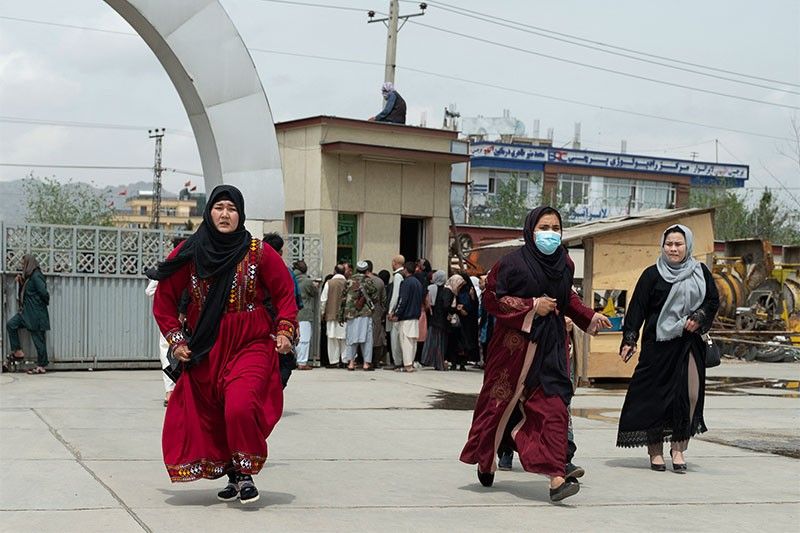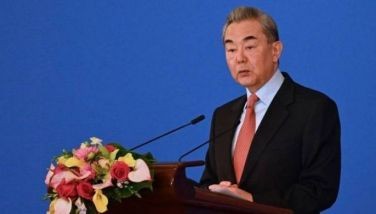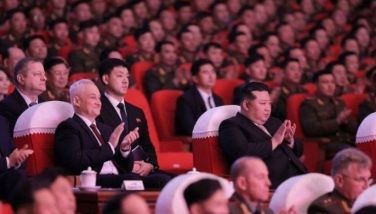Six killed in blasts at Shiite school in Afghan capital

KABUL, Afghanistan — At least six people were killed and 24 wounded on Tuesday by two bomb blasts that struck a boys' school in a Shiite Hazara neighbourhood of the Afghan capital, police and hospital staff said.
The number of attacks in Afghanistan has significantly declined since the Taliban ousted the US-backed government in August, but the jihadist Islamic State group has claimed several since then.
Several bodies were strewn outside the gate of the school in the densely populated Shiite Dasht-e-Barchi neighbourhood in Kabul, alongside patches of blood, burnt books and school bags, according to images posted on social media.
"We were leaving school and had just stepped out from the rear gate when the explosion occurred," Ali Jan, a student who was wounded in the first blast, told AFP at a hospital.
The second blast took place as rescuers arrived to ferry victims from the first explosion to hospitals.
"Some of our friends have lost hands, while some were covered in blood," said Saeed Rahmatullah Haidari, a student at the school.
"There were pieces of broken glass and pools of blood... my whole body was shaking."
Outside a hospital treating the wounded, Taliban fighters beat back the families of students who had gathered, slapping or pushing some of them as they searched for information.
Women cried out as they scanned through pictures of victims posted on nearby walls by medics.
Kabul police spokesman Khalid Zadran told AFP the attack outside the Abdul Rahim Shahid school was caused by two improvised explosive devices, killing six people.
A grenade was also thrown at a nearby English language centre in the same area, wounding one person, he later said.
Two hospitals said they were treating 24 wounded patients.
'Reprehensible attacks'
Amnesty International condemned Tuesday's "reprehensible attacks" against the Hazara community.
"It also shows that the Taliban, as the de-facto authorities, are failing to protect civilians, especially those from ethnic and religious minority groups, from harm," Amnesty International's South Asia Campaigner Samira Hamidi said in a statement.
The European Union's special envoy to Afghanistan, Tomas Niklasson, said those behind the "heinous" attacks must be held accountable, while the UN Secretary-General Antonio Guterres warned that attacks against civilians are "strictly prohibited under international humanitarian law."
The Dasht-e-Barchi neighbourhood is mainly home to the Hazara community and has been previously targeted by the Islamic State group — a rival of the Taliban, also a hardline Sunni Islamist movement.
The Hazara community, which makes up between 10 and 20 percent of the country's 38 million people, has long been the target of mass-casualty attacks, some blamed on the Taliban during their 20-year insurgency.
Since seizing power, the Taliban have regularly carried out raids on suspected IS hideouts, mainly in the eastern Nangarhar province.
Taliban officials insist their forces have defeated IS, but analysts say the jihadist group is a key security challenge.
It has claimed some of the deadliest attacks in Afghanistan in recent years.
In May last year at least 85 people — mainly girl students — were killed and about 300 wounded when three bombs exploded near their school in Dasht-e-Barchi.
No group claimed responsibility, but in October 2020, IS claimed a suicide attack on an educational centre in the same area that killed 24, including students.
In May 2020, the group was blamed for a bloody gun attack on a maternity ward of a hospital in the neighbourhood that killed 25 people, including new mothers.
Get the latest news as Taliban gains control of Afghanistan. Photo courtesy of Al Jazeera/AFP
Afghanistan's supreme leader said Sunday the country's women were being saved from "traditional oppressions" by the adoption of Islamic governance and their status as "free and dignified human beings" restored.
In a statement marking this week's Eid al-Adha holiday, Hibatullah Akhundzada -- who rarely appears in public and rules by decree from the Taliban's birthplace in Kandahar -- said steps had been taken to provide women with a "comfortable and prosperous life according to Islamic Sharia".
The United Nations expressed "deep concern" last week that women were being deprived of their rights under Afghanistan's Taliban government and warned of systematic gender apartheid.
Since returning to power in August 2021, Taliban authorities have stopped girls and women from attending high school or university, banned them from parks, gyms and public baths, and ordered them to cover up when leaving home.
They have also barred them from working for the UN or NGOs, while most female government employees have been dismissed from their jobs or are being paid to stay at home.
However, Akhundzada said "necessary steps have been taken for the betterment of women as half of the society".
"All institutions have been obliged to help women in securing marriage, inheritance and other rights," his statement read. — AFP
UN chief Antonio Guterres will gather international envoys at a secret location in Doha on Monday in an increasingly desperate bid to find ways to influence Afghanistan's Taliban rulers. — AFP
The UN Security Council adopted a resolution Thursday calling on Taliban authorities to "swiftly reverse" all restrictive measures against women, condemning in particular its ban on Afghan women working for the United Nations.
The resolution, unanimously adopted by all 15 Council members, said the ban announced in early April "undermines human rights and humanitarian principles."
More broadly, the Council called on the Taliban government to "swiftly reverse the policies and practices that restrict the enjoyment by women and girls of their human rights and fundamental freedoms."
It cited access to education, employment, freedom of movement, and "women's full, equal and meaningful participation in public life."
The Council also urged "all States and organizations to use their influence" to "promote an urgent reversal of these policies and practices." — AFP
G7 foreign ministers on Tuesday demanded the "immediate reversal" of a ban on women in Afghanistan working for non-governmental organisations and the United Nations.
"We call for the immediate reversal of unacceptable decisions restricting human rights and fundamental freedoms, including the latest bans prohibiting Afghan women from working for NGOs and the UN," the top diplomats said in a statement after two days of talks in Japan.
The group also slammed the Taliban authorities' "systematic abuses of human rights of women and girls and discrimination against the members of religious and ethnic minorities".
Taliban authorities triggered international outrage this month after extending a December ban on Afghan women working for non-governmental organisations to include the UN.
They have rejected criticism over the move, saying it is an internal issue that should be "respected by all sides." — AFP
The United Nations is being forced to make an "appalling choice" over whether to continue operations in Afghanistan while the Taliban government bans women from working for the organisation, the world body says.
Under their austere interpretation of Islam, Taliban authorities have imposed a slew of restrictions on Afghan women since seizing power in 2021, including banning them from higher education and many government jobs.
In December, they banned Afghan women from working for domestic and foreign non-governmental organisations, and on April 4 extended that to UN offices across the country.
In a statement Tuesday, the UN mission in Afghanistan said the ban was "unlawful under international law, including the UN Charter, and for that reason the United Nations cannot comply".
"Through this ban, the Taliban de facto authorities seek to force the United Nations into having to make an appalling choice between staying and delivering in support of the Afghan people and standing by the norms and principles we are duty-bound to uphold," it said. — AFP
- Latest
- Trending
































